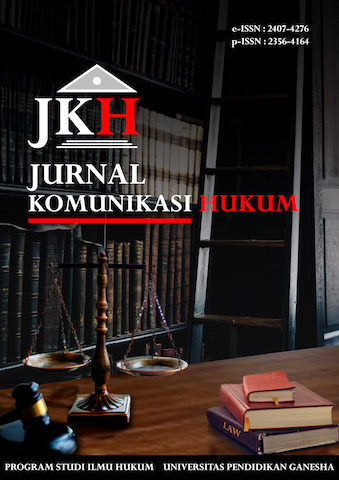EFEKTIFITAS PELAKSANAAN PIDANA MATI BANDAR NARKOBA
DOI:
https://doi.org/10.23887/jkh.v8i2.51641Abstrak
Hukuman mati menjadi salah satu perwujudan pidana pokok di Indonesia. Tidak hanya di Indonesia saja, negara lain yang jauh dari Indonesia juga masih memperdebatkan pemberlakuan pidana mati. Narkoba merupakan zat yang berbahaya yang bisa membuat generasi muda menjadi rusak. Narkotika sudah jadi bagian dari banyaknya pelaku narapidana pengedar atau bandar narkoba yang di pidana hukuman mati. Di satu sisi, pidana mati ditatap selaku sesuatu hukuman yang efisien sebab bisa membagikan dampak jera serta bisa membagikan kengerian terhadap seorang yang hendak melaksanakan kejahatan. Dalam menanggapi kasus tersebut, penulis menggunakan memakai pendekatan kualitatif. Penelitian kualitatif adalah memahami (memahami) gejala atau gejala sosial untuk lebih mengetahui dan memahami bagaimana gambaran utuh dari fenomena yang diteliti daripada memecahnya menjadi variabel-variabel terkait. Berdasarkan hasil penelitian, hukuman mati yang diterapkan dalam upaya pemberantasan tindak pidana narkotika ini masih menjadi pidana yang menjadi pilihan di Indonesia, terbukti melalui adanya pelaku yang adalah bandar dan pengedar narkoba yang dijatuhi pidana mati.
Unduhan
Diterbitkan
Cara Mengutip
Terbitan
Bagian
Lisensi
Authors who publish with this journal agree to the following terms:- Authors retain copyright and grant the journal right of first publication with the work simultaneously licensed under a Creative Commons Attribution License that allows others to share the work with an acknowledgement of the work's authorship and initial publication in this journal.
- Authors are able to enter into separate, additional contractual arrangements for the non-exclusive distribution of the journal's published version of the work (e.g., post it to an institutional repository or publish it in a book), with an acknowledgement of its initial publication in this journal.
- Authors are permitted and encouraged to post their work online (e.g., in institutional repositories or on their website) prior to and during the submission process, as it can lead to productive exchanges, as well as earlier and greater citation of published work (See The Effect of Open Access).
Authors who publish with this journal agree to the following terms:
- Authors retain copyright and grant the journal right of first publication, with the work [SPECIFY PERIOD OF TIME] after publication simultaneously licensed under aCreative Commons Attribution License that allows others to share the work with an acknowledgement of the work's authorship and initial publication in this journal.
- Authors are able to enter into separate, additional contractual arrangements for the non-exclusive distribution of the journal's published version of the work (e.g., post it to an institutional repository or publish it in a book), with an acknowledgement of its initial publication in this journal.
- Authors are permitted and encouraged to post their work online (e.g., in institutional repositories or on their website) prior to and during the submission process, as it can lead to productive exchanges, as well as earlier and greater citation of published work (See The Effect of Open Access).












